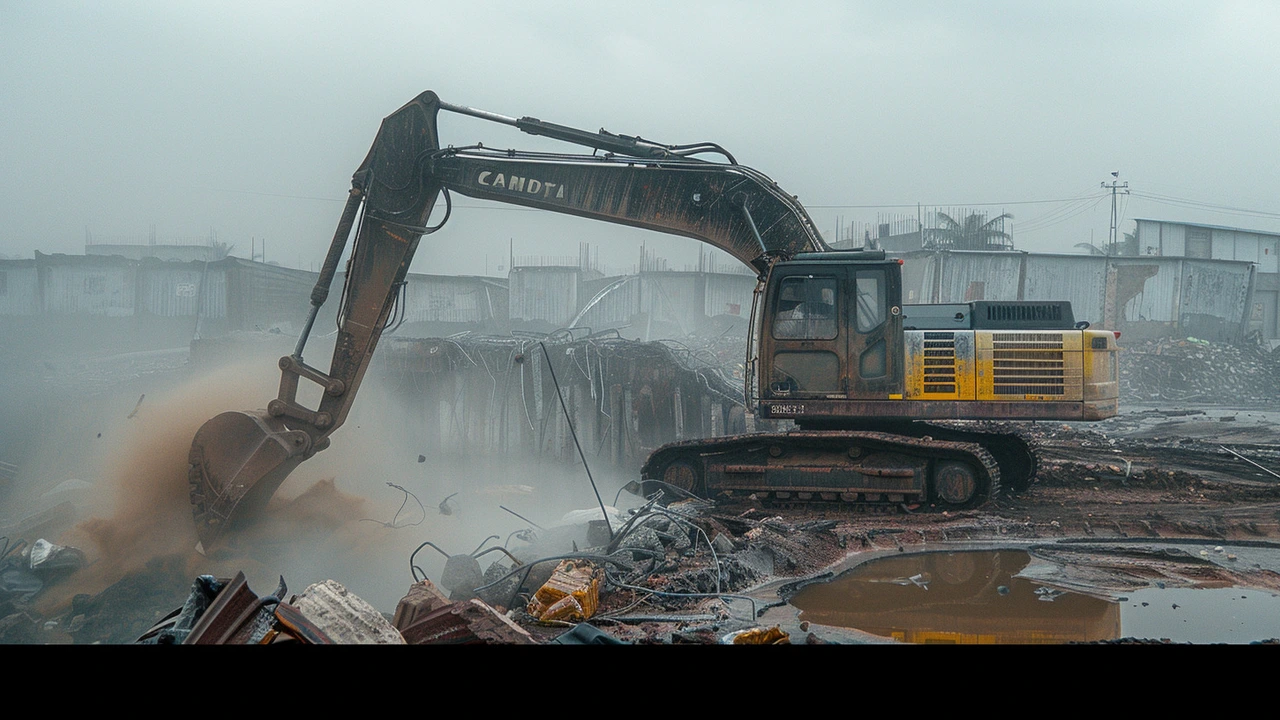Tensions Escalate Over Demolition for Lagos-Calabar Highway Expansion

Introduction
The construction of the Lagos-Calabar Coastal Highway, a project initiated by the federal government of Nigeria, has sparked notable controversy and distress among local residents and business owners. Recently, the Minister of Works, David Umahi, commenced the demolition of structures deemed to be within the government's right of way, affecting many, including the popular Landmark Beach Resort. This action has raised alarms over the approach taken by the government towards planning and executing such a significant infrastructure project.
Context of the Development
The Lagos-Calabar Coastal Highway is envisioned as a major infrastructural boost for Nigeria, expected to enhance transportation links and stimulate economic activities along Nigeria’s coastline. However, the execution phase, particularly the demolition process, has been fraught with issues. Property owners at the Landmark Beach and other affected establishments have voiced concerns over the lack of clarity and communication from the government. The absence of a detailed work plan and the hasty demolition have not only caused frustration but have also stoked fears about the future of many businesses.
Impact on Local Businesses and Employment
Several reports suggest that the demolition has led to the shutdown of businesses that once thrived along the Lagos beachfront. Establishments that served millions annually find themselves grappling with sudden displacement, with significant implications for employment. Workers at these facilities, including the Landmark Beach Resort, are uncertain about their job security and the continuity of their professions. This situation might lead to a ripple effect, impacting the broader economic landscape adversely.
Allegations and Government Response
Amidst the upheavals, allegations have surfaced accusing the government of demolishing structures indiscriminately. The Ministry of Works maintains that only shanties and illegally built structures are being removed. Nonetheless, testimonies from several property owners contradict this claim, stating that well-established businesses with proper documentation have also suffered losses. The dispute over what constitutes a 'shanty' versus a legitimate business has fueled further dissent against the project’s current management.
Lack of Compensation
One of the core issues exacerbating the tension is the lack of compensation for those whose properties have been demolished. Stakeholders have expressed their dissatisfaction with the government’s failure to provide timely and fair compensation, which is seen as a fundamental oversight in managing the collateral damage of such a large-scale project. The frustration is compounded by the apparent absence of a transparent framework guiding the compensation process, leaving affected parties feeling helpless and neglected.
Looking Ahead: Challenges and Expectations
As the project progresses, the need for a more organized and empathetic approach by the government becomes increasingly evident. Building a major highway should not only consider the physical infrastructure but also the socio-economic dynamics it alters. For Nigeria to truly benefit from such developmental projects, it is imperative that all stakeholders are adequately engaged and compensated. The success of the Lagos-Calabar Coastal Highway could hinge not just on its completion, but on the fairness and efficiency of the process itself.
In conclusion, while the Lagos-Calabar Highway holds the promise of economic transformation, the method of its implementation could well determine its success or failure. It is crucial that the Nigerian government revisits its approach, ensuring that future actions not only advance developmental goals but also protect and respect the rights and livelihoods of its citizens.
The whole demolish shindig is a total circus, and the gov't seems to think they're the only ones with a map. They blast through legit businesses like a bull in a china shop, and the only thing missing is a clown car to complete the spectacle.
It’s sad to see so many livelihoods disrupted, but a better road could bring new chances for everyone. Let’s hope the planners find a way to fix the mess and give fair help to those affected.
The demolition saga is being narrated as progress by those who sell us the future. Yet progress is not a synonym for ruin. When a highway cuts through a community it also cuts through memory. The loss of a beach resort is more than bricks it is a loss of culture. The government claims legality while ignoring the human equation. A contract signed on paper does not replace a promise made to a family. Compensation without transparency is a myth. The voices of the displaced become static in the noise of construction. History teaches us that roads built on blood sow dissent. If the state truly wishes to grow, it must first tend the roots. The current path resembles a bulldozer with no eyes. Empathy is a better blueprint than haste. A society measured by its infrastructure also measures by how it treats the vulnerable. The Lagos‑Calabar corridor can be a lifeline if its builders listen. Until the displaced are heard, the highway will echo emptiness.
What they don’t tell you is that the demolition crews are paid by shadow firms that profit from the land grabs. This isn’t about roads, it’s about a hidden elite reshaping the coast for their own gain. If you look at the pattern, every “development” follows the same playbook of intimidation and silence.
Yo i get the point but i think they overcomplicate it. The philsophy sounds nice but real people need cash now not another essay. they should just hand out proper payouts and move on.
I hear you. A better road could be a blessing, but only if the people who lose their jobs today get new ones tomorrow. Maybe a job‑training program tied to the highway construction could help bridge that gap.
The gov't should set up a clear compensation desk asap.
Yeah we need that fast it’ll give people hope and a chance to rebuild
Look, i get the fear but we cant let conspiracy take over the convo lets try to find a middle ground and push for real solution like a fair comp plan and transparent process